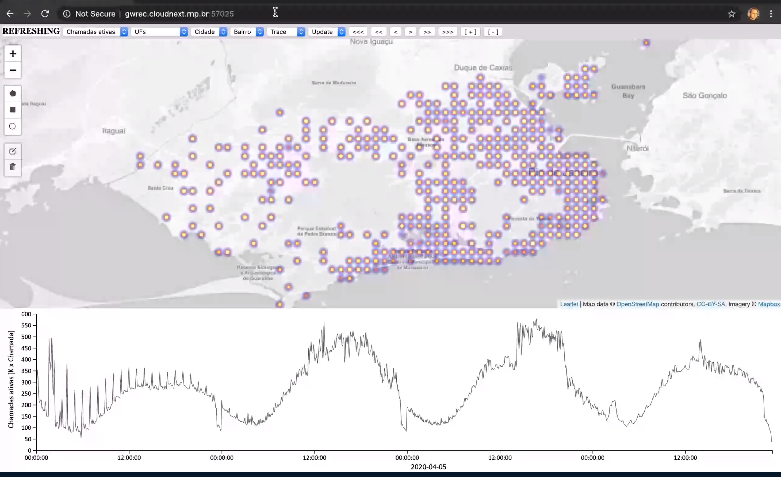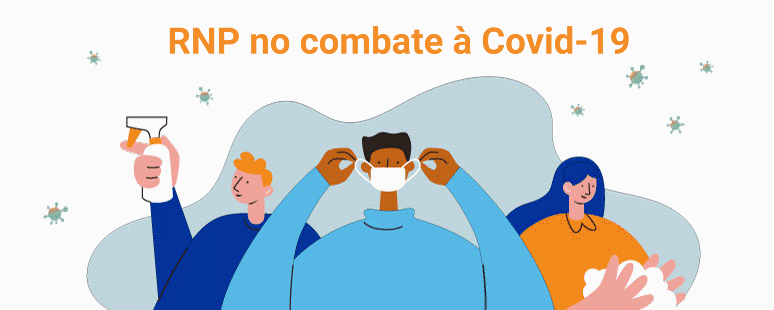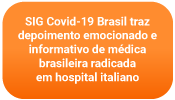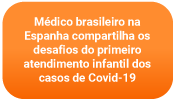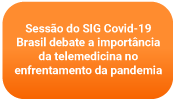6 initiatives with collaboration by RNP in a combat to Covid-19
The current situation requires a task force to combat Covid-19. RNP, a social organization associated to the Ministry of Science, Technology, Innovations and Communications (MCTIC), did not miss this mobilization for health and collaborates with a list of initiatives to assist patients, health professionals, health, and education and research institutions, as well as the society as a whole. In the hospitals, the front line of combat to the pandemic, or out thereof, remotely, RNP is present in actions, which deserve visibility. See some of them.
1. Digital Emergency Room of Instituto Laura
 What if you could, staying home, clear doubts about the new coronavirus, check whether you have any characteristic symptom of the disease and find out whether you have to go to a hospital? In the Digital Emergency Room (ER) service of Instituto Laura, artificial intelligence (AI) is giving order for initial on-line screening, in which the users answer series of questions, which will guide them whether they have to seek medical assistance or not. If this is the case, the platform also indicates the hospital, which is notified that a suspected case is on the way.
What if you could, staying home, clear doubts about the new coronavirus, check whether you have any characteristic symptom of the disease and find out whether you have to go to a hospital? In the Digital Emergency Room (ER) service of Instituto Laura, artificial intelligence (AI) is giving order for initial on-line screening, in which the users answer series of questions, which will guide them whether they have to seek medical assistance or not. If this is the case, the platform also indicates the hospital, which is notified that a suspected case is on the way.
Thus, the hospitals can foresee the demand for assistance and prepare to receive these patients. Following the recommendation from the health organizations in Brazil and the world, agglomeration, overcrowd and unnecessary visits to the emergency room are avoided, once one of the biggest concerns with the pandemic is the overload of the health system. See how the feature works:
Complementary to Digital ER, Laura System, which uses artificial intelligence and cognitive technology, helps medical teams from accredited hospitals to foresee risks of the patients´ clinical deterioration in advance. By means of the tool, the healthcare professionals gain time to assist the patients, avoiding damages, in addition to reducing costs for the hospitals. AI can still contribute providing governments and health centers with information to take more assertive decisions. Data about possible pandemic scenarios or substances for treatment and prevention, such as vaccines, can be obtained in simulations.
Laura System is about to be launched in Air Force Hospital (HFA) and Hospital de Base de Brasília, thanks to the partnership between RNP, MCTIC and Instituto Laura. The first of the benefited hospitals to put AI to “work” is HFA, which in phase of implementation. On the institution´s site, it is already possible to find a chat-bot working. Soon, the installation of the solution will be complete to assist those, who check in the health unit.
2. Solidarity to the Covid-19 pandemic task force
Another powerful action against the pandemic of the new coronavirus is solidarity. Among the group of initiatives to help the community is the service provided by Universidade Estadual de Campinas (Unicamp): a simple application to post announcements, bringing those who need close to those who have.
The electronic wall is similar to the Solidarity to Research platform, a sharing tool launched last year in partnership with RNP and the Higher Degree Personnel Improvement Coordination (CAPES) [Coordenação de Aperfeiçoamento de Pessoal de Nível Superior], to make donation and receiving of consumables within the academic and scientific community easier. The difference is that now, during the pandemic, the new active version aims to support combat to Covid-19 and any person can participate by donating or requesting materials, equipment, consumables or other items.

The objective is to benefit both health institutions and NPO, communities, the society in general and other solidarity organizations, or organizations, which need help in this situation. Participation is simple: it is not necessary to register, the interested shall access the Solidarity page and login with their credentials used in Google or Facebook accounts. To learn more about the initiative, read the full content produced by Unicamp.
3. Family Health Units
Connectivity to face Covid-19. RNP supports MCTIC and the Ministry of Health in the challenge to connect more than 16 thousand Family Health Units (USF) spread throughout the country, which do not have access to the internet yet. In Brazil, there are 42 thousand health units and at the end of the initiative, it is expected all of them to be connected. With the initiatives, healthcare professionals and managers gain more efficiency in assistance and to continue taking care of the patients at any time and in anywhere.
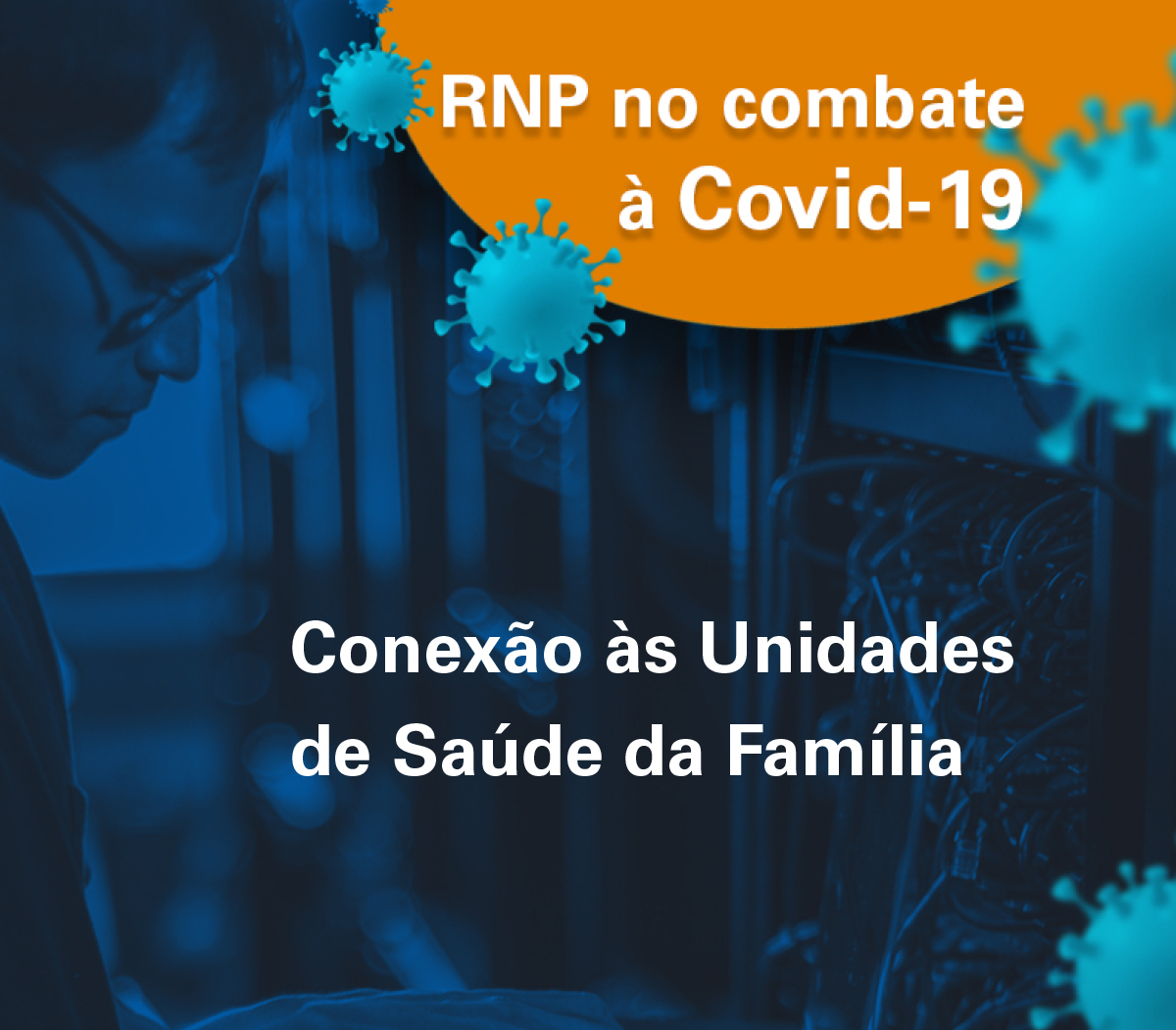 It is worth pointing out that USF represent the primary health service. Generally, for being installed close to where the people live, work and study, they are essential to assure the population´s access to quality service, in addition to contributing to collection of data to subsidy the research and the formulation of public health policies, especially, to face Covid-19. The connection of USF will enable flow of this big mass of data collected from patients, who arrive at the Units with symptoms of the disease, to the systems of the Ministry of Health. Thus, an important database is formed, and it will contribute for research of new drugs, medical-hospital protocols and adequate treatments to combat the pandemic.
It is worth pointing out that USF represent the primary health service. Generally, for being installed close to where the people live, work and study, they are essential to assure the population´s access to quality service, in addition to contributing to collection of data to subsidy the research and the formulation of public health policies, especially, to face Covid-19. The connection of USF will enable flow of this big mass of data collected from patients, who arrive at the Units with symptoms of the disease, to the systems of the Ministry of Health. Thus, an important database is formed, and it will contribute for research of new drugs, medical-hospital protocols and adequate treatments to combat the pandemic.
In the beginning of April, the minister of MCTIC, Marcos Pontes used the space to speak in a press conference to comment this and other initiatives involving RNP. “This is legacy, which remain for the Ministry of Health, which is very important for the country”, he commented about the connection of the units. Check out the full speech.
4. SIG Covid-19 Brazil
The commitment to gather those who are on the front line in the treatment of Covid-19 cases in Brazil and in other countries, such as China, Italy, Spain, Israel and the USA, to exchange experience, discuss health challenges and the possible routes of the pandemics, is already scheduled. On Mondays, Wednesdays and Fridays at 12 PM (Brasilia time), by Web Conference, in this room (click to access), there will virtual meetings of the Special Interest Group (SIG) Covid-19 Brazil. The interest group conferences are featured by reference guests and end up in debate with the other guests. The topics vary at every session, but they always deal with the technical-scientific support to the healthcare professionals in the pandemic.
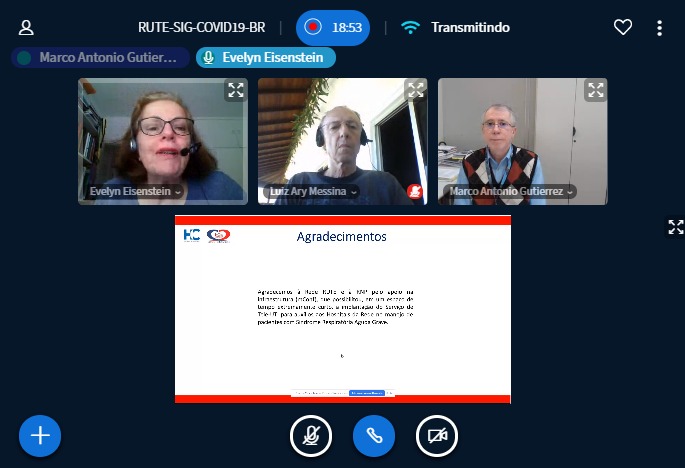 On the meeting on 04/24, for example, the director of the Informatics Service of InCor*, Marco Antonio Gutierrez shared the experience in the Tele ICU calls, a project of the government of São Paulo. The solution connects the medical team of selected hospitals to a remote team specialized in pulmonology via Web Conference. The objective of the action is to “relieve” the Intensive Care Units (ICU) by reducing the average time of hospitalization in the beds. “The faster we stabilize and take the patient out of the ICU, the faster another person, who is waiting in the ward will be attended”, Gutierrez explained.
On the meeting on 04/24, for example, the director of the Informatics Service of InCor*, Marco Antonio Gutierrez shared the experience in the Tele ICU calls, a project of the government of São Paulo. The solution connects the medical team of selected hospitals to a remote team specialized in pulmonology via Web Conference. The objective of the action is to “relieve” the Intensive Care Units (ICU) by reducing the average time of hospitalization in the beds. “The faster we stabilize and take the patient out of the ICU, the faster another person, who is waiting in the ward will be attended”, Gutierrez explained.
The action was spread throughout the media:
Other relevant topics marked the meetings. Check out the coverage of some of them:
SIG Covid-19 is an initiative of the University Telemedicine Network (Rute), supported by the MCTIC, financed by the Study and Project Financing Institution (Finep), associated to MCTIC, and by the Brazilian Association of University Hospitals (Abrahue), coordinated by RNP.
5. RNP communication services and collaboration
Like Web Conference for remote assistance in Tele ICUs, RNP has been joining efforts to boost the activities, especially those to combat the virus, of the ministries, the Brazilian academic community and the health institutions that use our communication and collaboration services.
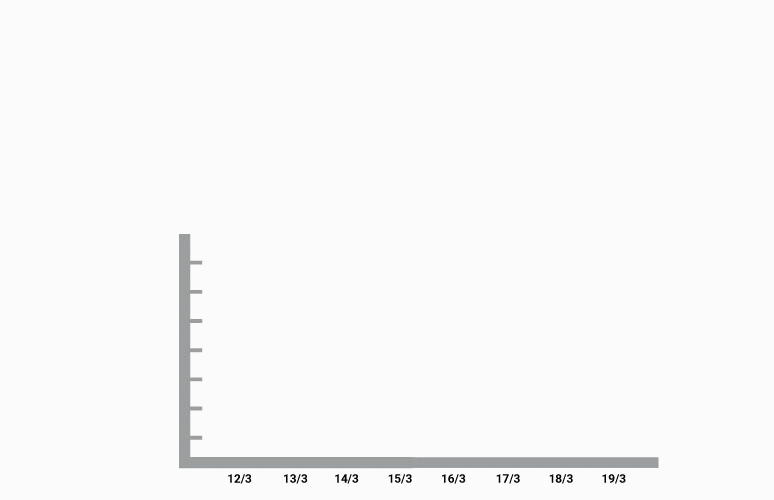
For this purpose, we expanded the access to the video-collaboration services. For example, Web Conference grow by 30% daily since the beginning of the crisis. In the end of April, we reached the number of 7 thousand users, and the total capacity was expanded to 15 thousand. Videoconference grew 72% in April compared to the same period last year. There were more than a thousand connected rooms and 477 meeting hours held in the service. Finally, Vídeo@RNP reaches half a million total access weekly.
For further information: download the video-collaboration e-book
RNP also worked in the routine of the institutions, which had to take the offices to the collaborators´ houses, in home office. The Brazilian Geological Service (CPRM) is one of the client institutions, which count on these services to continue the activities remotely. This was what the director-president of the institution Esteves Colnago, said in a video for the CPRM collaborators: “We are integrated to RNP today. This facilitates our communications a lot, in addition to reducing costs, as we are able to hold many meetings through videoconference. This has been exercised very intensively and has shown its efficiency in this context”, Colnago defended.
Watch Colagno's testimony in full.
6. Covid-19 Borescope Tool
How technology can help controlling the proliferation of the new coronavirus? The answer to this question is the essence of Covid-19 Borescope, a tool developed by a project of the Computing Science department of Universidade Federal Fluminense (UFF), coordinated by professor Antonio Augusto "Guto" de Aragão Rocha and developed by the student Nilson Luis Damasceno, supported by RNP. The project monitors the flow of people in the cities and correlates the mobility indexes with the data about contamination, supporting the responsible bodies in the decisions related to releasing or hardening social isolation.
Part of the solution uses the results from the Network Borescope project financed in the so-called RNP and Microsoft Challenge in Artificial Intelligence and to be able to store the huge amount of received data, computer resources from testbed “CloudNEXT”, one of the results from the project Cloudlab-Brasil financed by Finep (Contract/Convention 01.17.0004.00), were used.
